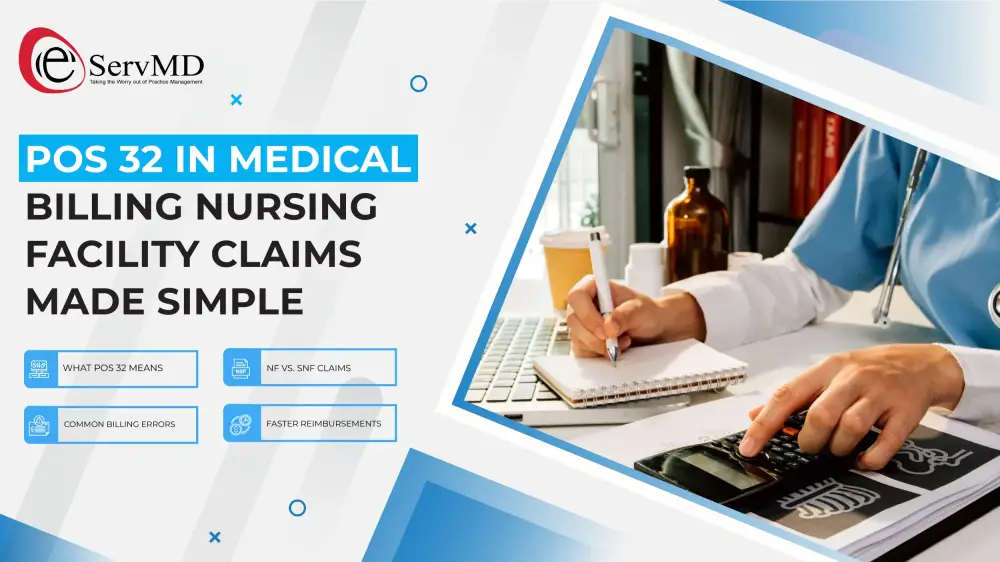
Dr. Patel, a family physician, once lost nearly $15,000 in reimbursements because his team confused POS 31 (Skilled Nursing Facility) with POS 32 (Nursing Facility). The claims were denied, and fixing them took weeks. This real-world mistake highlights how POS 32 in medical billing directly impacts revenue and compliance for providers.
In medical billing, Place of Service (POS) codes are not just numbers they determine how payers process claims, what reimbursement you receive, and whether your claim gets approved or denied. Among them, POS 32 is vital for providers working with Nursing Facilities (NF), and partnering with a trusted medical billing company in Florida can help ensure accuracy and compliance.
What POS Codes Mean
POS codes represent the physical location where medical services are provided. For example:
-
POS 11 – Office
-
POS 21 – Inpatient Hospital
-
POS 22 – Outpatient Hospital
-
POS 23 – Emergency Room
-
POS 31 – Skilled Nursing Facility
-
POS 32 – Nursing Facility
If you’ve ever wondered how these codes affect your claims, check out our guide:
👉 POS Codes in Medical Billing: A Quick Guide for Doctors
Why POS 32 Matters for Nursing Facility Claims
One of my colleagues, a geriatric specialist, shared that incorrect POS coding once delayed payments for over 40% of her nursing home visits. Once her staff understood POS 32 in medical billing, reimbursements stabilized.
Why does POS 32 matter?
-
It ensures compliance with CMS rules.
-
It guarantees accurate reimbursements for services provided in a Nursing Facility.
-
It prevents denials caused by mismatched patient settings.
Understanding Nursing Facility Claims
Let’s say you’re treating a patient for post-surgical rehabilitation in a long-term nursing facility. Using POS 21 (Inpatient) instead of POS 32 (Nursing Facility) would flag your claim as incorrect.
The CMS definition of POS 32 is:
Nursing Facility – A facility providing skilled nursing care and related services for residents who require medical or nursing care but are not in an inpatient hospital setting.
👉 Related resource: POS 11 in Medical Billing: The Office Code You Can’t Miss
When to Use POS 32
POS 32 applies when:
-
Patients are admitted into a nursing facility for long-term care.
-
Services provided include rehabilitation, chronic illness management, or daily nursing support.
-
The facility is not classified as a hospital (inpatient) or skilled nursing facility (SNF).
POS 31 vs POS 32: Key Difference
Many doctors confuse POS 31 (Skilled Nursing Facility) and POS 32 (Nursing Facility). Here’s the difference:
-
POS 31 (SNF): Patients receive skilled therapy or rehabilitation with medical supervision (short-term recovery).
-
POS 32 (NF): Patients live in a long-term care setting where skilled care may not always be needed.
👉 For SNF details, read: POS 31 in Medical Billing: SNF Claims Made Simple
Common POS 32 Billing Errors
A billing team I worked with had 20% of claims denied due to incorrect POS 32 coding. Their main errors included:
-
Incorrect code usage (using POS 21 or 31 instead of POS 32).
-
Documentation gaps (missing admission status or care notes).
-
Eligibility verification mistakes (patient status not updated).
Even small errors can disrupt revenue. That’s why accurate documentation and coding are non-negotiable.
👉 Learn how to avoid denials: POS 21 in Medical Billing: Inpatient Billing Made Simple
Best Practices for POS 32 Claims
Dr. Maria’s clinic saw a 35% drop in denials after implementing these POS 32 billing best practices:
-
Accurate coding & documentation – Always confirm the patient’s facility type before assigning POS.
-
Compliance with payer rules – CMS and private insurers may have different POS requirements.
-
Use technology to simplify billing – Automated claim scrubbing reduces manual errors.
👉 Related reading: POS 22 in Medical Billing: Outpatient Code You Must Know
How eServMD Helps Doctors with NF Billing
A provider once told me, “I spend more time fixing claim denials than treating patients.” That’s where outsourcing billing makes a difference.
At eServMD, we help providers with:
-
Claim accuracy – Correct POS coding for NFs.
-
Denial management – Faster resolution of rejected claims.
-
Improved reimbursements – Streamlined billing workflows.
👉 For ER-related coding, see: POS 23 in Medical Billing: The Code That Impacts Your ER Claims
Conclusion
Dr. Patel’s story is a reminder that getting POS 32 wrong can cost thousands but getting it right ensures compliance, smooth reimbursements, and less stress.
Key Takeaways:
-
POS 32 in medical billing applies to Nursing Facilities (NF).
-
Use it correctly to avoid claim denials.
-
Train staff, document properly, and leverage billing partners like eServMD.
👉 Ready to simplify NF billing? Schedule a Demo with eServMD and secure faster, error-free reimbursements in 2026.
FAQs:
Q1. What is POS 32 in medical billing?
A: POS 32 represents a Nursing Facility (NF) and is used on claims to show services were provided in this setting.
Q2. How is POS 32 different from POS 31?
A: POS 31 is for Skilled Nursing Facilities (SNF), while POS 32 is for standard Nursing Facilities. The services and billing requirements differ.
Q3. What are common errors in POS 32 billing?
A: Using the wrong POS code, incomplete documentation, and missing eligibility checks are the most common issues.
Q4. How can providers improve POS 32 claims?
A: By ensuring accurate coding, verifying eligibility, and working with billing experts like eServMD to reduce denials.
